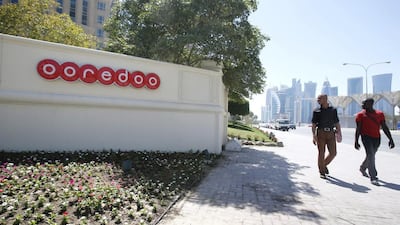Telecoms players are increasingly finding themselves in a tight spot and on the receiving end of negative ratings outlooks as competition stiffens across the region.
Bahrain Telecommunications (Batelco) is the latest operator at risk of being downgraded by the ratings agency Standard & Poor's (S&P), which has placed Batelco on negative watch, while Shuaa Capital recently issued a sell call on du.
Analysts are keen to note that a negative trend across the region has yet to play out and although some players such as Etisalat are still doing well, other operators are finding it difficult to maintain growth and market share.
Most of the bigger operators such as Etisalat and Ooredoocq (formerly known as Qtel) have branched out from their domestic markets, bidding for greenfield licences over the past few years as well as acquiring established players across Africa and Asia.
"The market is getting more competitive here in the Mena region," said Taher Safieddine, an equity research analyst at Shuaa Capital. "There is still room for growth but most of the multi-operators like STC, Etisalat and [Ooredoo] are looking for high growth and under-penetrated markets. This is why STC looked to South East Asia, Etisalat is pushing into Africa and mono-players like Mobily and du are pushing for growth in data revenue."
Regulators have played a key role in the fortunes of some telecoms companies in the region. Bahrain's regulator in particular has been pushing for greater competition and fair pricing. With three mobile operators and a few mobile virtual network operators (MVNOs) in such a small country, all have engaged in a fierce price war that has dented sales and profits.
"Competition in Bahrain particularly has become incredibly intense and exceeded our expectations on the impact on players like Batelco," said Alexander Griaznov, a telecoms analyst at S&P. "We will review both the business risk and the financial risk profile and the company's relationship with the government. The regulator has supported price declines and also introduced more competition with MVNO operators, it continues to be a difficult market."
Saudi Arabia's regulator is also keen to introduce further competition, having recently issued three MVNO licences. The impact on the three mobile operators - STC, Zain and Mobily - is unlikely to be as drastic as that in Bahrain, given the country's larger population and lower mobile penetration rate.
But even when regulators are not as proactive, the outlook is not always great for operators.
"Competition in the UAE is not very high," said Mr Griaznov. "There have been areas where du and Etisalat have introduced more competition, but at the same time Etisalat still has a significant advantage which was granted by the government."
Last week Shuaa Capital issued a sell recommendation on du, driven mostly by its forecast of higher royalty fees in the future. The revised fee structure is expected to reach 60 per cent of profits before royalty between 2016 and 2018, compared with 50 per cent in the preceding years.
"This translates into lower net profits and weaker FCF [free cash flow] generation from 2015 onwards, negatively impacting du's valuation," said Mr Safieddine.
The bulk of du's revenue is limited to the UAE market, and the company has yet to diversify geographically in an attempt to grow, unlike its sole competitor Etisalat.
S&P has a positive outlook for Etisalat, while Fitch Ratings has a stable outlook.
"Etisalat's management has done a good job of securing and maintaining a competitive advantage which supports their strong market position," said Mr Griaznov.
Etisalat is present in 15 markets and its planned acquisition of Maroc Telecomcq will only strengthen its position. But diversifying geographically can sometimes increase risks. Ooredoo has a negative outlook; S&P downgraded its view on Ooredoo nine months ago because of the telecoms company's aggressive expansion policy.
"STC has been more conservative with investments, which for us is a strength as a ratings agency," said Mr Griaznov. "They don't get diluted by weaker operations in weaker markets. Ooredoo has a negative outlook because of this reason. It has more exposure to emerging markets - materially weaker countries like Iraq - so the share of Ooredoo is diluted."
thamid@thenational.ae

Gulf telecoms poised for downgrades as competition intensifies
Telecoms players are increasingly finding themselves in a tight spot and on the receiving end of negative ratings outlooks as competition stiffens across the region.
Most popular today
